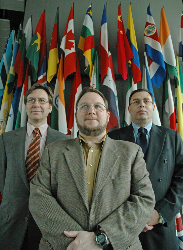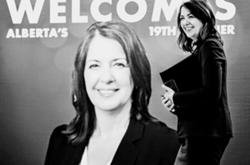
[Editor's note: The International Atomic Energy Agency is again at the centre of world attention as Iran restarts enriching uranium, sparking fears of potential nuclear weapons in the state. The Tyee spoke with three Canadians at the centre of the organization, last year awarded the Nobel Peace Prize.]
The Vienna International Centre is a massive and imposing complex of seven interconnected curved buildings, looking similar to Toronto's city hall. Past the UN and Unicef gift shops, the hair salon and the café and through security, you're faced with a multitude of flagpoles and a giant fountain under the shadow of the buildings housing hundreds of international workers.
The fountain is dry and the only flag flying is that of the International Atomic Energy Agency (IAEA) on a cold February morning. The IAEA's employees continue to do their day-to-day work of promoting "atoms for peace" as their motto says. But they're obviously surrounded by the tensions of another crisis involving Iran's nuclear programme.
Inspecting nuclear sites for peaceful use is just one of the UN-funded agency's roles which also works with energy and radiation for health care and cancer treatment. There are about two-dozen Canadians from all sorts of backgrounds working at the very centre of the IAEA in Vienna. Some are definitely working on verifying that Iran's nuclear material is kept safe, but nobody is allowed to talk about it. That does not prevent them, however, from talking about the challenges of trying to track and restrain the spread of nuclear weapons around the world.
TARIQ RAUF occupies one of the most senior IAEA posts. His role as head of verification and the security policy coordination section puts him in direct contact with both inspectors and countries around the globe. Rauf is responsible for ensuring IAEA scientists get into countries such as Iran and negotiating the access they need to completely verify the use of nuclear material.
The Pakistani-born Canadian spent almost two decades as one of a handful of experts on arms control and disarmament. After gaining a PhD in Russian and Soviet studies at the University of Toronto, he joined the Canadian Centre for Arms Control and Disarmament, and later the Canadian Institute for International Peace and Security. He joined the IAEA in 2002. He was one of a handful of top officials and experts who put together the recent report on Iran, after which the IAEA voted to refer the issue to the UN Security Council.
Rauf organizes the visas for inspectors and said the process has become harder since September 11 as nations tighten their visa requirements. But the IAEA still has to be allowed in. The 53-year-old said "The inspectors come up with their own missions -- we are responsible for getting their visas and if they're denied, we have to find out why.
"States who have safeguard agreements with us have a legal obligation to issue visas to inspectors. Those with additional safeguard protocols have to give a one-year multiple-entry visa so we can go in at any time.
"A country has right to refuse visa to any of our inspectors -- we cannot insist. But we have 250 to 300 inspectors so we just go find another and apply again. It does not happen that often.
"The inspectors might also need particular guidance in dealing with certain countries, how not to rub people up the wrong way, etc.
"And we have to write reports on technical matters that our board of directors can understand -- you can't explain these issues in 15-second sound bites.
"The board is interested in knowing whether nuclear material is being properly used or not, if it's being used to make weapons or not, if a country is living up to their safeguard obligations.
"Verification is a cooperative exercise, not like cops going after bad guys."
Incentives needed
Rauf said Canada has always been a leader in nuclear disarmament issues, arguing for a nuclear-free world and against weapons in space. "It is a position that has transcended political parties in Canada," he said.
"But there is a gap in who verifies disarmament. We know we are not going to achieve a nuclear-free world in the near future. But why do we still need 30,000 nuclear warheads armed, many on the same level of alert as in the Cold War?
"What message are we sending? Canada's security is taken care of under NATO, so Canada essentially relies on nuclear weapons for security. So how can they go to India and Pakistan, for example, and say you don't need nuclear weapons?
"The international community is not providing incentives to move away from weapons of mass destruction."
Rauf said Canada is one of the top three countries -- with Japan and Germany -- who have the world's largest amount of nuclear material, so the country has a natural role to play in making sure that material is safe.
JEAN PIERRE PAQUETTE is a satellite imagery analyst based in the same round building at the centre of Vienna's UN complex as the main meeting hall for the IAEA.
Born in Goose Bay, Labrador, Paquette spent 20 years in the Canadian military specializing in reading the technical maps before beginning to work for the IAEA seven years ago.
"I'm an investigator," said 47-year-old Paquette. "I don't feel any pressure of the world to prove or disprove anything. I have a job to do, to find the facts, good or bad, without being biased.
"Whatever we do with the agency is done on a trust basis. Canada sends people to the IAEA to help them do their job better.
"I would like to believe that I'm doing something for a higher cause -- politically I'm unbiased and because of that I feel I can provide an effective service to the international community.
"I'm proud to be Canadian but I can stay impartial. Canada's multiculturalism has given me a leg up interacting with other nations. Don't pre-judge them.
"And we have a strong Canadian work ethic, an attitude of getting things done now and not procrastinating. I think we do pretty well over here."
Satellite eyes
Paquette started helping the Iraq Nuclear Verification Office in 2002 as the international community went looking for proof of their weapons of mass destruction.
He needed to identify sites for inspectors to check as well as giving them the directions to get there. It's a major difference the satellite imagery has given the agency, allowing them to know exactly where they're going, rather than being at the whim of minders.
The IAEA buys high-resolution pictures from private companies to keep impartial and has only been using the technology since 2001. Paquette and others can check for any changes to a nuclear site, good or bad. "Satellite imagery has given the agency a leg up on verification," he said.
"A member state can tell you something, but you look on a map and say, ok, I can agree with this and this. That doesn't mean they're doing something wrong. In the time between declaration and when the image is acquired, there might be construction or deconstruction.
"For example, if a commercially run nuclear site in Canada wanted to build on to a site, they don't necessarily have to declare it. It could be a year delay in information.
"If there's a change for whatever reason, we identify that to the inspectors and they bring it to the site owner. Our mandate isn't to do searches of countries. The UN can't be perceived as spying. I loathe the term spying.
"A country doesn't have to declare a site or anything until 180 days before nuclear material arrives at the site."
Paquette said they have to rely on media reports in many cases because private companies control nuclear material. That doesn't mean "they're proliferating or getting into anything clandestine", but the IAEA has to keep tabs on the entire nuclear process. He still checks Iraqi sites in preparation for inspectors returning in the future, and admits he's looked almost everywhere in the world by satellite, except the Caribbean.
"It helps to be a very curious person," he added.
MARC VIDRICAIRE is the highest ranking Canadian at any international organisation in Vienna. He joined the IAEA as director of public information in August 2005, just weeks before his wife, Marie Gervais-Vidricaire, took up the post as Canada's ambassador to Austria, and the IAEA.
Originally from Montreal, Vidricaire spent almost a quarter-century in the Canadian diplomatic service, most recently as director of the nuclear and chemical disarmament implementation division. He was responsible for Canada's involvement with the IAEA for three years before reaching Vienna.
Now the 51-year-old manages the huge media interest in issues such as Iran -- there were 250 reporters at the last IAEA board meeting -- as well as promoting the work of the IAEA in ensuring peaceful uses of nuclear power and radiation. "The agency is a lot more than verifying the peaceful use of nuclear technology," said Vidricaire. "We will assist countries in developing nuclear technology, but not promote it.
"Most people don't realise we can't go beyond our mandate. We can't go and say the weapons states should negotiate disarmament. Non-proliferation means enforcing peaceful use of nuclear technology.
"We have demonstrated that with necessary tools, we can be quite effective and quite independent to particular pressure. It's probably the basis for the Nobel Peace Prize."
Vidricaire said Canada has an important role to play in international organisations, especially in the nuclear field.
"Canada is the largest exporter of uranium in the world and of radiation cancer treatment equipment," he said. "People don't know that Canada is a very significant player in the nuclear field.
"We have many Canadians working for international agencies. We recognise our international identity comes from a strong commitment to international organisations."
Tristan Stewart-Robertson, originally from New Brunswick, is news editor of the Greenock Telegraph in Scotland. ![]()















Tyee Commenting Guidelines
Comments that violate guidelines risk being deleted, and violations may result in a temporary or permanent user ban. Maintain the spirit of good conversation to stay in the discussion.
*Please note The Tyee is not a forum for spreading misinformation about COVID-19, denying its existence or minimizing its risk to public health.
Do:
Do not: